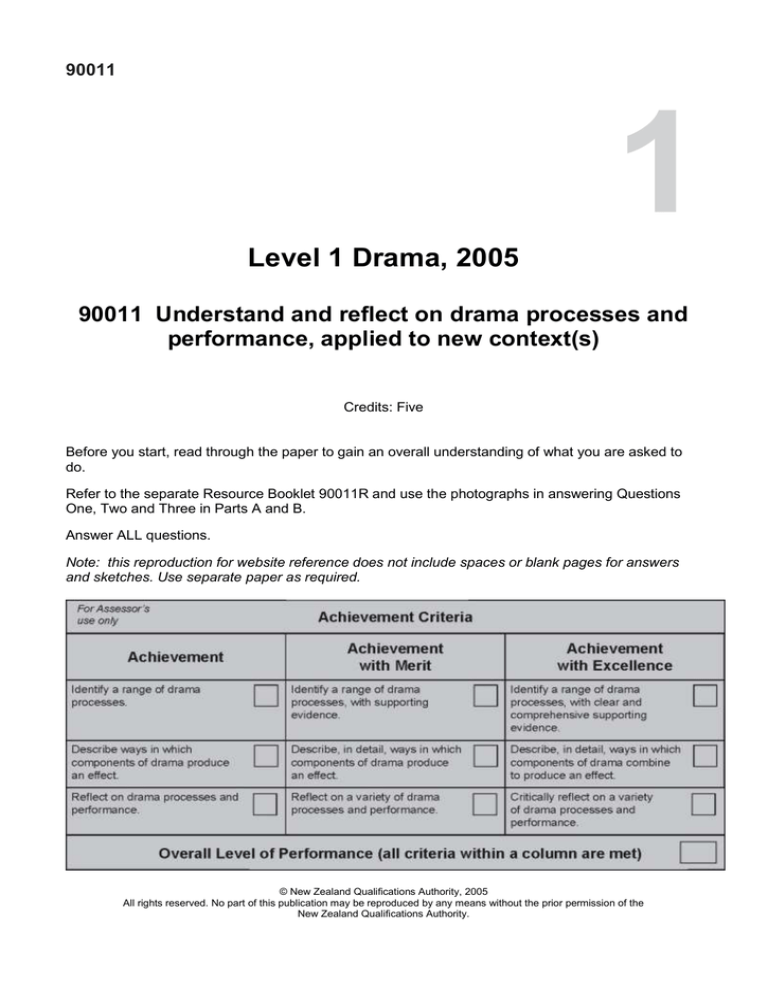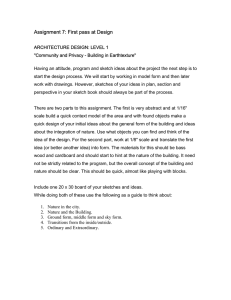
90011
1
Level 1 Drama, 2005
90011 Understand and reflect on drama processes and
performance, applied to new context(s)
Credits: Five
Before you start, read through the paper to gain an overall understanding of what you are asked to
do.
Refer to the separate Resource Booklet 90011R and use the photographs in answering Questions
One, Two and Three in Parts A and B.
Answer ALL questions.
Note: this reproduction for website reference does not include spaces or blank pages for answers
and sketches. Use separate paper as required.
© New Zealand Qualifications Authority, 2005
All rights reserved. No part of this publication may be reproduced by any means without the prior permission of the
New Zealand Qualifications Authority.
You are advised to spend 120 minutes answering the questions in this booklet.
Instructions
A sketch page follows each question (but see Note on front cover). These may be used to further
explain your written answers. Label sketches to clarify the points you are making.
PART A: Identify a range of drama processes
QUESTION ONE
Here are some drama processes:
blocking (planning) the actors’ movements
taking direction
using body language
using space
using makeup and / or properties (props)
Study Photographs 1, 2 and 3 in your Resource Booklet 90011R.
Photographs 1 and 2 show moments from a rehearsal process and photograph 3 shows a moment
from the final performance of the same play.
Look carefully at the photographs for evidence of how the use of the drama processes listed above
has contributed to the final performance.
Choose THREE processes from the list above to write about.
Write your choices here:
Process 1:
Process 2:
Process 3:
Give evidence from the photographs of the use of each of your chosen processes. You may refer to
any one or all of the photographs in your answer for each process. Give specific details to support
your answers.
Process 1:
Evidence of the use of this process seen in the photographs:
Process 2:
Evidence of the use of this process seen in the photographs:
Process 3:
Evidence of the use of this process seen in the photographs:
SKETCH PAGE FOR QUESTION ONE
Sketch on this page if you wish to further explain your answers to Question One. Label sketches
clearly.
L1 Drama 2005, 90011 – page 2 of 5
PART B: Describe ways in which components of drama produce an effect
QUESTION TWO
Study Photograph 4 in Resource Booklet 90011R.
Look closely at the characters and the relationships between them.
(a)
Describe the ways in which the space has been used to convey ideas about the characters and
the relationships between them. Give specific details from the photograph to support your
answer.
Ways space has been used:
Ideas conveyed:
(b)
Describe the ways in which body language and facial expression have been used in
combination to convey ideas about the characters and the relationships between them.
Give specific details from the photograph to support your answer.
Ways body language and facial expression have been used in combination:
Ideas conveyed:
SKETCH PAGE FOR QUESTION TWO
Sketch on this page if you wish to further explain your answers to Question Two.
Label sketches clearly.
L1 Drama 2005, 90011 – page 3 of 5
QUESTION THREE
Here is a list of drama technologies.
costume
lighting
properties (props)
Study Photograph 5 in Resource Booklet 90011R. Look closely to see how technologies have been
used for effect.
Choose ONE technology from the list above. Write your choice here:
(a)
Describe the ways in which the technology chosen has been used to create an effect. Give
specific details from the photograph to support your answer.
Ways technology has been used:
Effect:
Study Photograph 5 again
(b)
Describe how sound could be used in combination with any of the technologies shown to
create an effect. Give specific details from the photograph to support your answer.
Ways sound could be used in combination with any other of the technologies shown:
Effect:
SKETCH PAGE FOR QUESTION THREE
Sketch on this page if you wish to further explain your answers to Question Three.
Label sketches clearly.
L1 Drama 2005, 90011 – page 4 of 5
PART C: Reflect on drama processes and performance
QUESTION FOUR
Here are some drama processes that you will have undertaken in drama this year.
devising a scene
exploring a theatre form
making a mask or puppet
rehearsing a performance
exploring a technical role
Choose ONE process to reflect on. Write it here:
(a)
Describe how TWO steps you took in the process chosen above helped you to develop your
work. Give specific details to support your answer.
Step 1:
Step 2:
(b)
Describe what you might do differently if you were using this process again.
Give specific reasons for your answer.
SKETCH PAGE FOR QUESTION FOUR
Sketch on this page if you wish to further explain your answers to Question Four.
Label sketches clearly.
QUESTION FIVE
This year you will have seen live theatre performed.
Write the title of ONE live production you have seen:
(a)
Give TWO examples from the production of how the acting was convincing and / or
unconvincing.
Reflect on the actors’ use of body, voice, movement and / or space. Give specific details to
support your answer.
Example 1:
Example 2:
(b)
Give TWO examples from the production of how the use of technology was effective and / or
ineffective. Technologies could include lighting, set, sound, video projection, costumes, stage
make-up.
Give specific details to support your answer.
Example 1:
Example 2:
SKETCH PAGE FOR QUESTION FIVE
Sketch on this page if you wish to further explain your answers to Question Five.
Label sketches clearly.
L1 Drama 2005, 90011 – page 5 of 5

